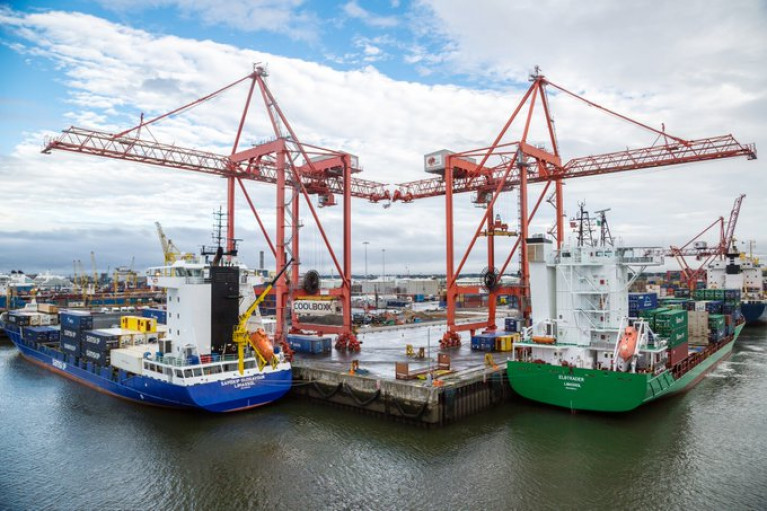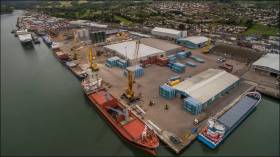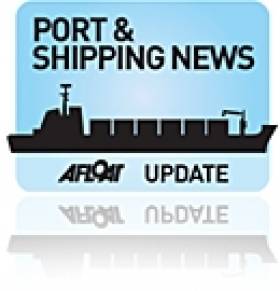Displaying items by tag: EU Ports
Keep European Ports Going - COVID-19 Exit and Recovery Strategy
Europe’s ports have been doing everything possible since the start of the Covid-19 crisis to ensure the continuity of their operations and thus the security of supply.
European ports have activated contingency plans to ensure that ports remain fully operational during this crisis. More than ever, European ports have been demonstrating their role as essential and critical infrastructures playing a crucial role in the supply of necessary goods.
The first and most important priority of European ports is to help overcome the health crisis by ensuring the continuity of their operations and providing citizens, health services and businesses with the goods and materials they need.
However, European ports believe that the EU needs to decide on a recovery strategy on how to overcome the economic crisis Europe is facing.
On their side, European port managing bodies are cooperating as best as they can with their stakeholders and customers to help them solve the challenges they will be facing in the forthcoming months.
As engines of growth, European ports will play an important role in the recovery process. To ensure that ports keep going and can help revamp Europe’s economy in the aftermath of the crisis, ESPO proposes the following:
European ports, their stakeholders and their customers must, when and where needed, be able to benefit from immediate relief measures developed at both the EU and national levels. This will help the port ecosystem to bridge the temporary lockdown and impact of some limited or non-functioning port stakeholders. This temporary support will enable European ports and related industries to catch up as swiftly as possible once the confinement measures are lifted. During past crises, ports have proven to be a very resilient sector, able to rebound rapidly. An important condition for such a recovery is to ensure the short term financial viability of the maritime industry and the most affected businesses in the port. All European ports should be considered for such measures, regardless of their TEN-T status.
European ports ask EU policy makers to strengthen the existing support and financial instruments for infrastructure projects in ports, in particular CEF, and to reinforce investments to allow European ports to play their role in the decarbonisation of Europe’s economy. The current crisis shows the key and critical role of port infrastructure and well-functioning port operations in ensuring the supply of essential goods and material. This is only possible if European ports continue to invest, remain state-of-the-art and further improve their hinterland connectivity. Advancing planned CEF calls could also be a way of boosting investments in ports. Such support should be provided notwithstanding the governance and economic model of ports and should include their respective critical hinterland infrastructures (inland waterways, railways, pipelines, roads).
Ongoing port and transport infrastructure projects which are delayed due to national lockdown measures (in particular the temporary stop of construction works) require flexibility on deadlines and should not fall under the use-it-lose-it principle. Guidance should be further developed and discussed with the relevant project managers involved in ongoing projects, taking away the current uncertainty in their planning.
Ports with important passenger traffic and/or tourism-related activities (notably ferry connections but also cruise) suffer an even more significant drop in activity and must be given special consideration. The recovery of touristic and travel activities risks to take longer in view of the severe travel restrictions within and outside the European Union. Initiatives aiming at restoring the trust in the sustainability, health and safety of maritime passenger traffic and cruise should be developed.
Isabelle Ryckbost, Secretary General of ESPO, comments: “In all European ports it is now really all hands on deck to remain operational and to fulfil their critical and essential role in the supply chain. The contingency plans are working well. I can say that European ports remain fully operational. It is now important to prepare for what comes after the crisis. The port ecosystem is facing serious economic impacts, but ports have proven in the past to be resilient. In order to catch up quickly once the health crisis is under control, and to play their role as engines of growth in Europe’s economic recovery, it is important that ports and the affected businesses in the port are supported when and where needed. The support must help in bridging this period of none or reduced economic activity. It is also important that port and transport infrastructure projects and investments can be pursued as planned and if possible even reinforced”.
ESPO Asks to Recognise Cross-Border Dimension of EU Ports & Strengthen Maritime Connectivity
#Ports&Shipping - Over the next decade the investment needs of European ports amounts to 48 billion EUR, according to a report by the European Sea Ports Organisation (ESPO).
Many port investments score high in creating societal value but the return on investment for the investor, the port managing body, is often low and slow. For these investments, external funding is needed. Ports have only been able to obtain 4% of the CEF transport budget over the last three years. These are the main results from the Study ESPO launched in spring 2018 in preparation of the Connecting Europe facility II proposal which came out on 6 June 2018.
ESPO welcomes the CEF II proposal and appreciates the efforts that have been made to further optimise and ensure the continuation of this important financial instrument for transport.
“ESPO is fully recognising the importance and benefits of the Connecting Europe Facility; we should use the experience of the past three years to further optimise this instrument; we count on the European Parliament and the Council to safeguard the budget proposed, which is a real minimum. Given their important role as nodes of transport, energy, industry and blue economy ports deserve more than the 4% share they obtained over the last three years. Concretely we believe that ports and the maritime dimension should be better recognised under the cross-border priority. Seaports have the potential to link any number of Member States through maritime transport, as well as to link the sea with a wide hinterland and economic area that in most circumstances exceeds the national borders. They are by nature cross-border and should be recognised in that respect”, says ESPO’s Secretary General Isabelle Ryckbost.
Based on the outcome of the ESPO study, ESPO formulated concrete recommendations and suggestions in its position paper to further optimise the Commission proposal.
ESPO asks the Parliament and Council to:
- ensure that an increased share of the CEF budget is accessible to ports, reflecting their essential role in the European Transport network;
- recognise the cross-border nature of ports and the maritime cross-border dimension which has the potential to link a port not only with their neighbours but with all other maritime Member States;
- re-integrate the currently pre-identified port and MoS projects in the Annex of pre-identified sections of the new proposal;
- put more emphasis on the decarbonisation investments to be made;
- better define the military mobility budget share, which will receive 1 on 5 EUR of the CEF transport budget and to prioritise the transport policy priorities in defining the dual-use;
- use the military mobility budget to enhance the resilience of Europe’s infrastructure and, in particular its port infrastructure, to cyber security threats and ensure that ports can play their vital role as part of the emergency supply chain;
- exempt projects with a limited impact on the national transport network from Member State endorsement;
- highlight the importance of the maritime connections of the EU with its neighbouring countries;
- ensure optimal connectivity of Ireland to mainland Europe in the context of Brexit;
- foresee a review mechanism following the review of the TEN-T guidelines in 2023 and the outcome of the Brexit negotiations.
The proposal is currently under discussion in the Parliament and the Council. Last week, the EP-TRAN rapporteurs, Pavel Telička (ALDE, CZ) and Marian-Jean Marinescu (EPP, RO), presented their draft report (read or download) in the TRAN Committee. The deadline for amendments is 13 September.
EU Ports Welcome Foreign Investment Screening As Instrument for Open Investment Environment
#Ports&Shipping - The European Commission published a Proposal for a Regulation last September, establishing a framework for screening of foreign direct investments into the EU and a Communication entitled “Welcoming foreign direct Investment while Protecting Essential Interests”.
The European Sea Ports Organisation (ESPO) welcomes the fact that the Commission proposal is stressing the importance of an open investment environment. The port sector is capital intensive. Over the last decades ports in Europe have benefitted from substantial investment from outside the European Union, both directly into assets and in some cases, into significant equity stakes in port owners. The ports sector recognises the important role these investments have played in the development and success of European ports. ESPO therefore believes that having an open investment environment should remain one of the basic principles of Europe’s Trade policy.
European ports are essential nodes in the transport chain and important gateways to the world. But many ports are also strategic nodes for energy generation, trade, storage and distribution, increasingly important clusters of industry and blue economy and - in many areas of Europe - essential for the mobility of people. In this role, ports may also pursue objectives of general interest in close cooperation with local communities such as safety as well as ambitious air quality and decarbonisation policies. European ports are in many ways strategic assets. Investments into essential and/or critical European port infrastructure of general interest, which enable effective participation in the management or control of a company, should be assessed from that perspective.
European ports have been designated as “critical infrastructure” according to the Critical Infrastructure Directive (2008/114/EC). Overall, European ports play an indispensable role in the supply of goods and the logistic chain. Because of the geo-political situation and given their location, some European ports are or can become at some point an essential part of an emergency supply chain, in view of ensuring the connectivity of the region with the main markets, as well as function as important strategic points for military operations. Where this is the case, these ports should be considered as such in the context of European transport and port policy.
ESPO welcomes the current Commission proposal insofar that it provides a basic framework for existing screening mechanisms in the European Union, without imposing any Member State to develop such a framework. It can give guidance to those Member States that currently do not have such a framework, avoiding ad hoc political decisions on whether a third country investment can take place or not. It also follows the logic of existing screening policies in countries which are important trading partners of the EU (US, Canada, Australia, China, Russia and Japan). It must, however, be implemented in a way that does not jeopardise either through action or perception the ongoing inward investment that has benefitted the European Ports sector. Any initiative should also take into account the diversity in governance and ownership of European ports.
ESPO believes that more transparency among Member States on important foreign direct investments can help the Member States in their decision making. The information received in application of the Regulation should be used only for that purpose. It is essential that the Commission and Member States ensure full confidentiality in that respect.
ESPO believes that proportionality and consistency should be paramount in the implementation of any screening mechanism to ensure that Europe remains an attractive place to invest in ports and that those signals are clear to investors. Screening processes should be clear and objective. Screening criteria and thresholds should be clear and targeted specifically at identified causes of concern.
ESPO understands the wish of the Commission to screen foreign direct investments likely to affect projects of Union interests and relating to projects which involve a substantial amount or an important share of EU funding (such as EU funded TEN-T infrastructure). The Commission should respect the same framework as the Member States and demonstrate full transparency in its screening policy.
ESPO believes that any investment into essential and critical port infrastructure should be made in full respect of EU competition and state aid rules. Foreign companies should be subject to the EU legal framework and assessed in the same way as European companies. Particular attention should be given in that respect to the market investor principle.
EU competition policy should have the tools to assess foreign investments and undertakings in the same sector against the level playing pitch in the shipping and port sector and have a proper assessment of the dominant market position in that respect.
Finally, ESPO believes that the principle of reciprocity and non-discriminatory access for EU companies to foreign port sectors should be the cornerstone of any decision on foreign direct investments.
ECA Believes Marco Polo Rail Programmes Have Failed
#MarcoPolo- According to a new report, published yesterday by the European Court of Auditors (ECA), Marco Polo programmes have been ineffective and should be discontinued in their current design. The programmes are aimed at shifting freight away from the road towards other modes of transport, using EU funds.
One of the main findings of the audit was that there were serious indications of "deadweight" referring to projects which would have gone ahead even without EU funding. In fact, 13 of the 16 beneficiaries audited confirmed that they would have started and run the transport service even without a subsidy.
In addition, there were no reliable data to assess benefits on the environmental impact of freight transport, road congestion or road safety. The audit also found that there were not enough relevant project proposals put forward because the market situation and the programme rules discouraged operators from taking advantage of the scheme. Half of the audited projects were of limited sustainability.
"The programmes were ineffective as they did not meet the targets, little impact was achieved in shifting freight off the roads and there were no data to assess the achievement of the policy objectives" said Ville Itälä, ECA member responsible for the report.
Since 2003, the Marco Polo I and II programmes have financed transport service projects designed to shift freight transport from road to rail, inland waterways and short sea shipping. The programmes have been part of the EU transport policy objective to develop alternatives to road-only freight transport.
This generally accepted objective aims to reduce international road freight traffic, thereby improving the environmental performance of freight transport, reducing congestion and increasing road safety.
Given the results of the current programmes, ECA recommends discontinuing EU funding for transport freight services following the design of the Marco Polo programmes.
In the future, such funding should depend on an impact assessment at the outset, showing whether and to what extent there is EU added value. This should involve a detailed analysis of potential demand and best practice in the Member States.
Ports & Shipping Review: Port Sector Meeting, Maersk Join Rivals,Asia-Europe Trade Up, US Training Ship and Newbuild High
#ShippingReview: Over the last fortnight Jehan Ashmore has reported from the shipping scene where European port representatives and trade unions met for the first Sectorial Social Dialogue Committee for the Port Sector.
AP Moeller-Maersk A/S the World's largest container line, said it will pool vessels with its two biggest rivals in an effort to manage overcapacity and raise unprofitable freight rates.
Volumes from Asia to Europe grew just 0.1% in the first four months of the year to 4.4m TEU, according to the latest figures from Container Trades Statistics. This growth was mainly fuelled by an up-lift in Asia to Mediterranean services, with volumes declining from Asia to north Europe.
US training ship T.S. Empire State (1962/14,557grt) made a visit to Dublin Port having crossed the Atlantic Ocean. The veteran vessel, a former general cargo ship dates back to the era before containerisation.
Orders for newbuildings reached a two year high, with 222 ships of over 15m dwt in May, a level not seen since May 2011.


































































